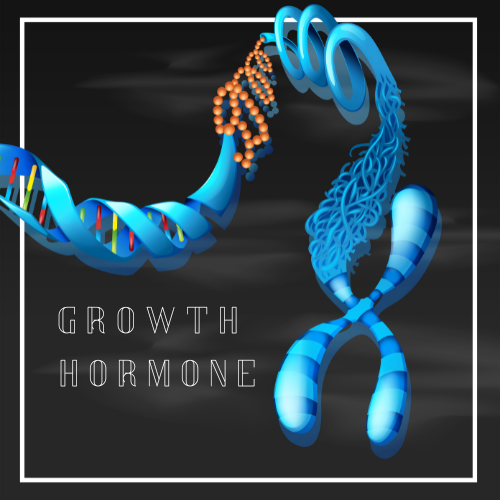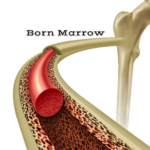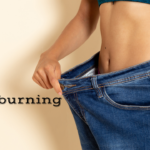What Are Growth Hormones?
Growth hormones (GH), also known as human growth hormone (HGH), are naturally produced by the pituitary gland, a pea-sized structure at the base of the brain. These hormones are crucial for cell growth, tissue repair, metabolism regulation, and muscle development.
Growth hormones are especially active during childhood and Adolescence, helping with height and organ development. However, their importance continues throughout life, contributing to muscle strength, fat burning, bone health, and energy levels.
Key Functions of Growth Hormones
Stimulates Growth in Children and Teens
HGH is the driving force behind height and bone growth in youth. It ensures proper physical development during puberty.
Regulates Metabolism
HGH plays a vital role in breaking down fats and using them as energy. It also supports protein synthesis, which is key for muscle repair and recovery.
Boosts Muscle Mass and Performance
By increasing amino acid uptake and collagen production, growth hormone enhances muscle strength, endurance, and post-exercise recovery.
Supports Bone Density and Strength
With the help of IGF-1 (insulin-like growth factor-1), HGH improves bone density and helps prevent osteoporosis, especially in aging adults.
Enhances Physical and Mental Well-Being
Optimal HGH levels support:
- Higher energy levels
- Sharper focus and memory
- Better mood
- Improved immune function
What Causes Growth Hormone Deficiency?
Growth hormone deficiency (GHD) can occur in both children and adults due to several causes:
Genetic disorders or congenital conditions
- Tumors affecting the pituitary gland
- Brain injuries or surgeries
- Aging and hormonal decline
- Poor sleep and chronic stress
Symptoms of HGH Deficiency:
| In Children | In Adults |
| Short stature | Fatigue |
| Delayed puberty | Increased fat around the waist |
| Slow bone growth | Muscle weakness |
| Poor academic performance | Mood changes, depression |
HGH Therapy: A Medical Overview
HGH replacement therapy involves injecting synthetic HGH to treat hormone deficiencies or certain health conditions. It’s only legal when prescribed by a doctor.
FDA-Approved Uses:
- Children with HGH deficiency or genetic conditions (Turner syndrome, Prader-Willi syndrome)
- Adults with pituitary gland issues or muscle-wasting diseases (e.g., HIV/AIDS)
- Short bowel syndrome treatment
Benefits of HGH Therapy:
- Improved growth in children
- Increased muscle mass and lean body composition
- Reduced body fat, especially abdominal fat
- Enhanced bone mineral density
- Boosted mood and cognitive health
Possible Side Effects:
- Joint and muscle pain
- Swelling in arms or legs
- Carpal tunnel syndrome
- Insulin resistance and increased diabetes risk
- Possible link to certain cancers (with long-term use)
HGH in Sports and Bodybuilding: Controversial but Common
Despite being banned in professional sports by the World Anti-Doping Agency (WADA), many athletes misuse HGH for:
- Faster recovery
- Enhanced muscle growth
- Better endurance
- Fat loss and body sculpting
Note: Non-prescribed use of HGH is illegal in many countries and can have serious health consequences.
Misuse and Abuse of HGH
Due to its anabolic effects, HGH is often misused by athletes and bodybuilders. Some use HGH for:
- Faster muscle gain
- Quicker recovery
- Fat loss
- Anti-aging benefits
However, using HGH without medical supervision is illegal and potentially dangerous.
Natural Ways to Increase HGH Production
Looking to boost HGH naturally? Here are the most effective lifestyle habits and strategies:
Get Deep, Restful Sleep
- Most HGH is secreted during deep sleep stages.
- Aim for 7–9 hours of uninterrupted, quality sleep.
Perform Intense Exercise
- High-intensity interval training (HIIT) and resistance training trigger HGH spikes
- Combine weightlifting and cardio for the best results.
Practice Intermittent Fasting
- Fasting lowers insulin levels and enhances HGH secretion.
- Try 16:8 or 18:6 fasting windows.
Reduce Sugar and Processed Carbs
- High insulin levels suppress HGH.
- Avoid soda, candy, white bread, and other refined carbs.
Optimize Your Diet
- Eat foods rich in amino acids like arginine, glutamine, and glycine.
- Include lean protein, leafy greens, and omega-3s.
Avoid Eating Right Before Bed
- Late-night meals elevate insulin, which lowers HGH release during sleep.
Manage Stress Levels
- Chronic stress increases cortisol, which blocks HGH production.
- Practice yoga, deep breathing, or meditation.
Try Supplements Wisely
Supplements that may support natural HGH release:
- Arginine
- Glutamine
- Melatonin
- GABA
- Vitamin D3 Always consult your doctor before starting any new supplement regimen.
Growth Hormone Myths vs. Facts
| Myth | Truth |
| HGH is only for kids | Adults also benefit from optimal HGH levels |
| HGH therapy is always safe | Only safe under medical supervision |
| Natural HGH boosters don’t work | Lifestyle changes can significantly boost HGH |
| HGH makes you superhuman | It improves health, but doesn’t work like magic |
Medical Use of Growth Hormones
HGH therapy is an FDA-approved treatment for several medical conditions:
In Children:
- Growth hormone deficiency
- Turner syndrome
- Prader-Willi syndrome
- Chronic kidney disease
In Adults:
- HGH deficiency due to pituitary disease
- Muscle-wasting disease associated with HIV/AIDS
- Short bowel syndrome
Growth Hormone Therapy: What to Expect
HGH therapy typically involves injections of synthetic HGH. The dosage and duration depend on the condition being treated. Therapy is usually monitored by an endocrinologist.
Benefits:
- Improved growth in children
- Increased muscle mass and strength
- Better metabolism and energy in adults
Risks:
- Carpal tunnel syndrome
- Joint and muscle pain
- Insulin resistance or type 2 diabetes
- Edema (swelling)
- Increased cancer risk (in rare cases)
When to Get Tested for HGH Deficiency
If you experience the following symptoms, it may be time to get your HGH levels checked:
- Constant fatigue
- Increased belly fat
- Reduced libido or performance
- Anxiety or mood swings
- Slow recovery from workouts
Diagnostic Tests Include:
- IGF-1 blood tests
- GH stimulation tests
- MRI scan of the pituitary gland
HGH and Anti-Aging: Hype or Hope?
HGH has gained popularity in the anti-aging community for its ability to:
- Reduce wrinkles
- Improve skin elasticity
- Increase energy and libido
- Enhance cognitive clarity
However, long-term effects remain debated, and many experts advise against using HGH solely for anti-aging without a medical need.
Final Thoughts: Should You Consider HGH?
Growth hormones are essential for health, performance, and longevity—but balance is key. Whether you’re dealing with a medical deficiency or looking to optimize naturally, it’s important to approach HGH with science-backed strategies.
Always consult a healthcare professional before starting any hormone therapy. If you’re aiming to increase HGH naturally, focus on sleep, exercise, nutrition, and stress management—these are the most sustainable, safest ways to elevate your health.
Frequently Asked Questions (FAQs)
Q1: Can HGH help you lose weight?
A: Yes, HGH aids fat metabolism but is not a standalone weight-loss solution. Lifestyle plays a crucial role.
Q2: Is HGH legal?
A: Yes, but only by prescription for legitimate medical use. Recreational or enhancement use is illegal.
Q3: Can adults grow taller using HGH?
A: No. Once your growth plates close (after puberty), HGH cannot increase height.
Q4: How long does HGH therapy take to show results?
A: Initial results may appear in 3–6 months, but optimal outcomes can take 12+ months under medical guidance.
Q5: Does HGH improve athletic performance?
A: While it may aid in recovery and strength, the risks and legality make it a controversial choice.


